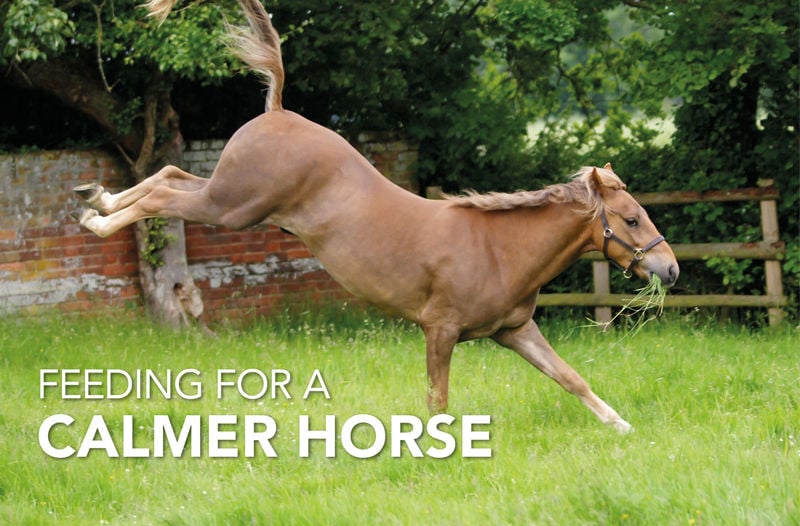You may be wondering what you can do to effectively manage your horse’s behaviour. It is always important to bear in mind that horses are unpredictable animals, and it often doesn’t take much to cause a change in their behaviour. When a horse becomes too sharp for the handler or rider, there’s an increased risk to safety and the ever-important fun factor to equestrianism can be lost.
How can you feed for a calmer horse?
Behaviour can be influenced by factors such as a change in routine or environment, restricted turnout and even pain. Once these triggers have been ruled out, we can look at their nutritional management as a route to supporting a calmer horse.
Compound Feeds
Nutrition can play a big role in the horse’s behaviour, so it is important to be aware of what the horse’s diet comprises of, and where changes can be made.
Feeding regimes that influence calmer behaviour in horses include:
• Feeding a fibre-based diet, high in forage
• Reducing sugar and starch (cereal) levels
• Feeding an appropriate energy (calorie) intake
Seasonal Changes
Horses can become more excitable around springtime when the grass starts to come through. If this is proving a problem, look to reduce the horse’s grass intake and provide alternative forage.
Calming Supplements for horses
Horse calming supplements are hugely popular due to their effect on behaviour. Feedmark Steady-Up® is an effective horse calming supplement and is ideal for horses of a nervous or excitable nature to aid concentration.
The main ingredients in Steady-Up® are two types of Magnesium. Magnesium is a naturally occurring trace element which helps to control neurotransmitters in the brain leading to a calming effect, and a reduced heart rate response to stress1. It is well known that a deficiency in Magnesium can lead to stressy, difficult behaviour and evidence suggests that when Magnesium is fed alongside certain herbs in a horse calming supplement it has a greater effect.
When choosing a calmer for your horse, it is important to consider one with prebiotics as these have been found to support behaviour. Undesirable behaviour is often triggered if the bacterial population within the horse’s gut is unbalanced, and a prebiotic can help to maintain a healthy bacterial balance, therefore reducing any discomfort.
The prebiotic Brewer’s Yeast is a key component of Steady-Up® and is commonly fed to encourage relaxation. Brewer's yeast is derived from the Saccharomyces cerevisiae strain of yeast and contains high levels of B vitamins and amino acids. Thiamine (vitamin B1) is known for its calming properties and in human research, Thiamine supplementation is shown to improve behaviour in humans who are deficient, whilst playing a crucial role in mental performance2. Tryptophan is a naturally occurring amino acid from Brewer’s Yeast which is used by the body to make Serotonin, a chemical messenger thought to stabilise mood.
The soothing herbs Chamomile and Lemon balm have traditionally been used to aid calm behaviour in both humans and animals. Both herbs have antioxidant properties which guard against oxidative damage3 and therefore reduce the rate of oxidative stress in horses4. Chamomile and Lemon Balm work together to relax and calm your horse and Lemon Balm is also known to have neurological benefits.
Chamomile is well known for its soothing properties and is often recommended during times of stress and anxiety. Chamomile can help to relax muscles and nerves through its antispasmodic activity. It also contains a naturally occurring active substance called apigenin which has a positive influence on anxiety5.
Together, this formulation of helpful ingredients makes Steady-Up® the ideal choice if you’re considering using a calming supplement for your horse.
Summary
• Understand why your horse is behaving this way and rule out any pain that could be attributing to spooky or excitable behaviour.
• Choose a high fibre feed over a high starch and sugar feed and add oil for slow release energy if additional calories are needed.
• Monitor grazing, and effectively manage the horse’s grass intake to prevent a sudden increase in grass consumption (such as moving paddocks to lush summer grazing).
• Feed an effective horse calming supplement, such as Feedmark’s Steady-Up®.
References
1Pearson, W & MacNicol, J. (2017) Acute Effects of a Single-Dose Nutritional Product on Stress Response and Task Completion in Horses. Journal of Equine Veterinary Science, 51:86-91
2Bellisle, F. (2004) Effects of diet on behaviour and cognition in children. British Journal of Nutrition, 92 (2): 227-232.
3Pereira, R.P., Fachinetto, R., de Souza Prestes, A., Puntel, R.L., Santos da Silva, G.N., Heinzmann, B.M., Boschetti, T.K., Athayde, M.L., Bürger, M.E., Morel, A.F., Morsch, V.M., Rocha, J.B.T. (2009) Antioxidant Effects of Different Extracts from Melissa officinalis, Matricaria recutita and Cymbopogon citratus. Neurochemical Research, 34: 973-983.
4Alsaadi, S., Muniem, A., & Aljobory, I.S. (2016) Study the Variation in Biochemical Parameters of Post Colic Surgical Horses Which Treated With Chamomile Flowers. Imperial Journal of Interdisciplinary Research, 2 (11): 1964-1968.
5Murti, K., Panchhal, M.A., Gajera, V., & Solanki, J. (2012) Pharmacological Properties of Matricaria recutita: A Review. Pharmocologia, 3 (8): 348-351.

